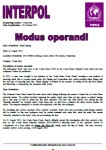Costa Rica uses INTERPOL Purple Notice to warn about illegal shark finning
Media Release
INTERPOL
06. November 2013
———————–
LYON, France – An alert for a method of shark finning aimed at avoiding detection of illegal practices has been circulated to all 190 INTERPOL member countries after a case was identified by Costa Rican authorities.
An INTERPOL Purple Notice has been circulated for a modus operandi of the technique where only a band of skin to keep the fin attached to the spine is retained and the remainder of the body discarded at sea. This method is aimed at circumventing legislation banning finning which states that the fins of the shark must be ‘naturally attached’ to the body.
Details of the case, which were identified by the Costa Rican National Coast Guard, were presented by the head of the INTERPOL National Central Bureau (NCB) in San José, during the second INTERPOL Fisheries Crime Working Group meeting which opened in Nairobi, Kenya on Monday, 4 November.
Head of NCB San José Gustavo Chinchilla said: “This is an opportunity to encourage other member countries to share types of modi operandi, in order to alert enforcement authorities to environmental crimes. I strongly believe that international cooperation and use of INTERPOL´s tools, such as Purple Notices, allow us to provide a more coordinated and effective response to addressing fisheries issues.”
The Purple Notice – to seek or provide information on modi operandi, objects, devices and concealment methods used by criminals – was requested by Costa Rica following its first National Environmental Security Seminar (NESS) held in San José in August of this year.
The Seminar brought together law enforcement officers from national environmental enforcement agencies, the national police, NCB San José and specialized officers from INTERPOL’s Environmental Security unit from the General Secretariat headquarters in Lyon, France, and provided an opportunity for discussion and information exchange on illegal fishing and other related crimes.
“Improved communications and increased sharing of information between countries provide law enforcement with an added advantage and facilitate the identification of criminals and new criminal techniques. Costa Rica’s use of INTERPOL’s system of notices is a perfect example of this,” said David Higgins, head of INTERPOL’s Environmental Security unit.
“This is now the second Purple Notice issued in relation to fisheries crime, and we hope that it will encourage other member countries to make increased use of INTERPOL notices to combat all types of environmental crime,” added Mr Higgins.
The Purple Notice was issued under the umbrella of INTERPOL’s Project Scale, a global initiative to detect, suppress and combat fisheries crime which is estimated to cost the global economy up to USD 23 billion each year and is linked to other forms of organized and transnational crime including corruption, money laundering, document fraud, and human and drug trafficking.
Project Scale was launched in February 2013 and is funded by the Norwegian Ministry of Foreign Affairs, the US Department of State and the Pew Charitable Trusts. In addition to raising awareness of fisheries crime. The project coordinates operations to target this criminal activity, disrupt trafficking routes and harmonize national and regional enforcement efforts.
Source: INTERPOL
Modus operandi
Requesting country: Costa Rica
Date of publication: 29 October 2013
Type of incident: Shark finning
PDF – DOWNLOAD
—


There is still NOT ENOUGH being done against shark finning in Costa Rica, columbia or anywhere else in the world either. I just read in the paper yesterday I forgot where it was but it was illegal in the country to do sh ark finning…. they gave him MESSLY LITTLE $100 fine!!
There is still NOT ENOUGH being done against shark finning in Costa Rica, columbia or anywhere else in the world either. I just read in the paper yesterday I forgot where it was but it was illegal in the country to do shark finning…. they gave him MESSLY LITTLE $100 fine!!